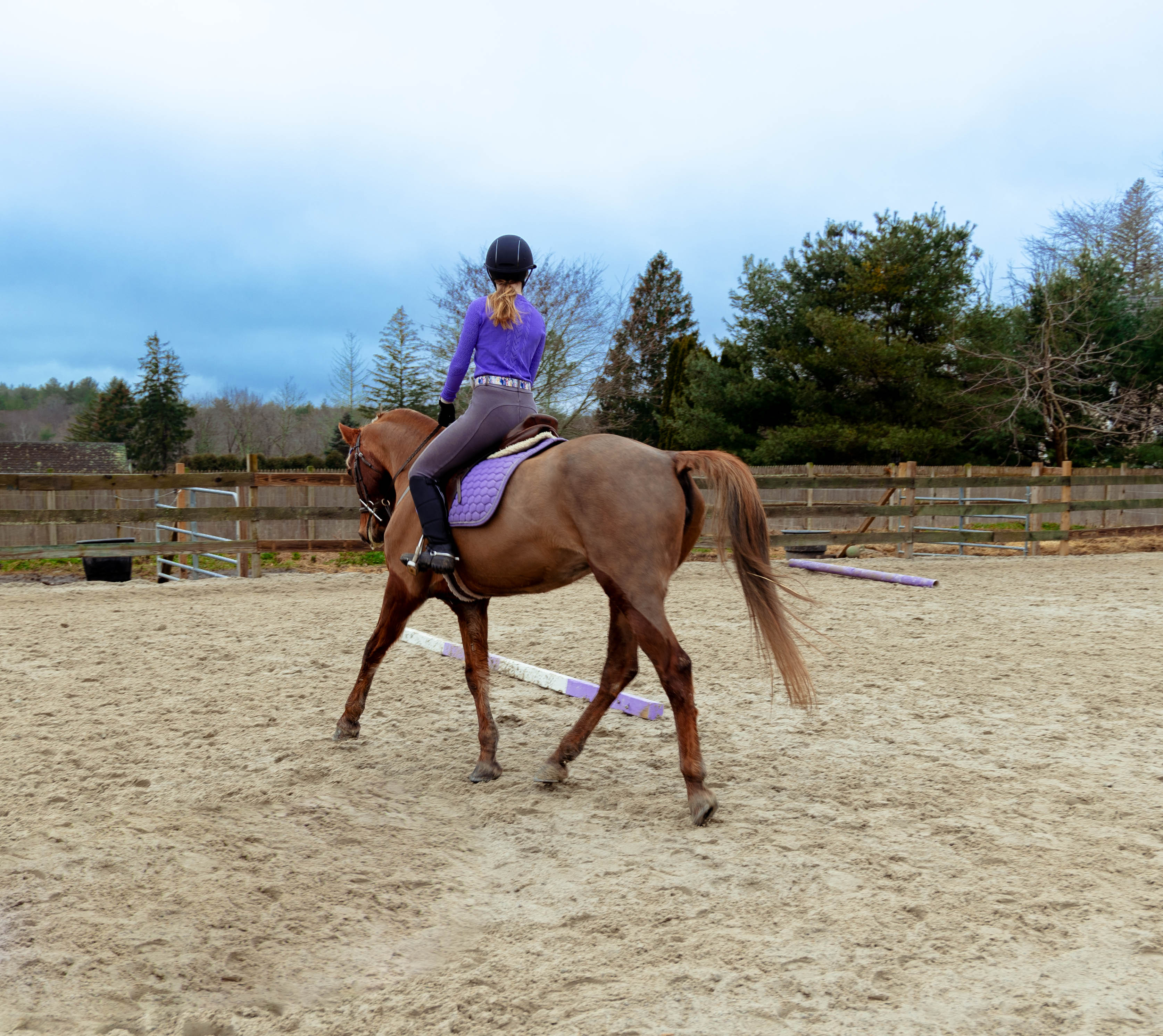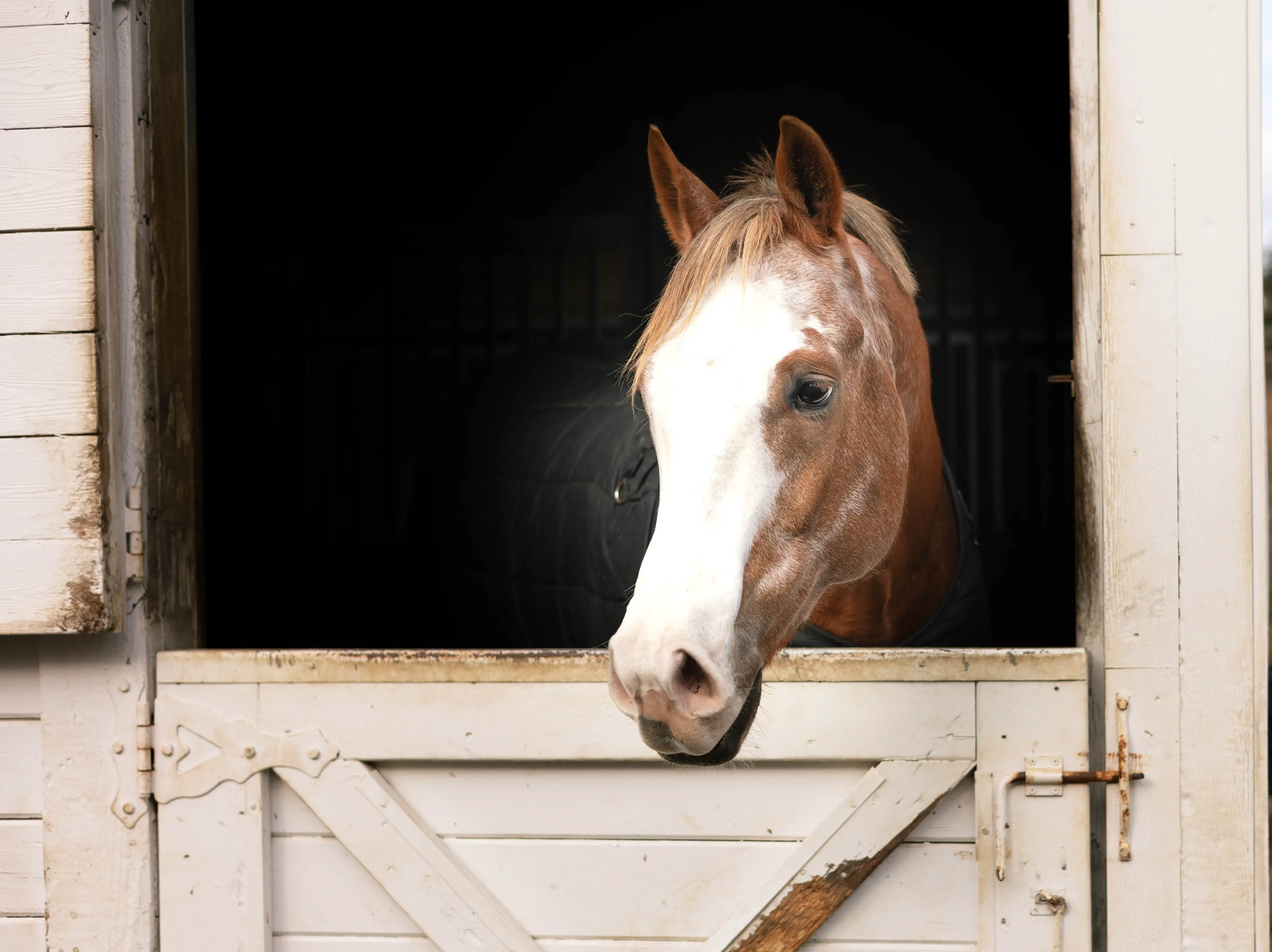The complete guide on how to keep your kids safe at the barn. Whether you’re at the barn for horseback riding lessons or to visit your horse, these rules are super important! Parents don’t always realize the true danger of being in the barn and sometimes allow their children to play. Here are some things to keep in mind to keep your kids out of harms way.
Keep Your Kids Safe At The Barn By Following The Barn Rules
This probably goes without saying but the best way to keep your kids safe at the barn is to follow the posted barn rules. Many of the rules that are typically covered in your farm’s barn rules will be outlined below. First and foremost, when you’re at the barn you are on someone else’s property, using their equipment and handling their horses. Not only is it appropriate etiquette and respectful to follow the rules, they’re also there for your own protection!
Most barns are sticklers when it comes to following the rules. No only do the barn owners and managers care about your family staying safe, they love their horses! Horse people LOVE their horses! They will do anything to protect them! They also love having a safe and happy environment for all of their customers.
No Smoking
Two words, barn fire. Need I say more? Lots of items you find in barns are flammable and the last thing anyone needs is a barn fire. Additionally, second hand smoke is bad for the horses and the other humans in the barn. Your barn probably has more than one sign stating it too, if there’s one rule you follow and respect it should be this one.
Don’t Feed The Horses
There are a few reasons this rule is important. First, one way to keep your kids safe at the barn is to prevent them from losing a finger. But seriously, even a gentle horse could accidentally nip your child’s fingers when treats are being hand-fed. Hand feeding is dangerous and creates bad habits. Most barns do not allow horses to be hand fed treats except on rare occasions and usually advise students to use the horses feed bucket to deliver treats.
Secondly, some horses have special diets and certain foods are dangerous to all horses. Whether you think you are knowledgeable about horses and their dietary needs you should not feed someone else’s horse. Period, end of story. You don’t know what health conditions or dietary restrictions a horse may have, for example if a horse has Cushing’s disease their owner likely does not let them eat treats high in sugar.
Close Gates Behind You
Stall doors, gates across the drive way, paddock gates, arena doors and gates etc. all need to be closed behind you. If you open it, close it! A horse can accidentally leave the farm and head down the road or into the wrong paddock with another horse in the blink of an eye. And both could lead do injury and trauma. This one is a close second to no smoking in the barn.
Do Not Scream Or Yell
Loud noises can easily startle a horse and when you have a thousand pound animal in the barn around children, a spook can be dangerous. Horses are not only easy to startle, they cannot see directly in front of them and sometimes where their feet are stepping. That means they could inadvertently step on or run over the people in the barn. Even when it comes to horses that are not afraid, screaming and yelling is disruptive and causes stress to both the people and the animals in the barn. If your kids are acting out at the barn by yelling, screaming or having a tantrum, please remove them until they calm down.
No Running In Or Around The Barn
This one is hard because well, kids enjoy running and moving around in addition to being loud. That’s ok, it’s normal. But it is important that your child understands the barn is not the place for running. Horses can easily be startled by running and quick movements just like yelling. However, running is also dangerous for other reasons. Your child could easily trip and fall, and hurt themselves in the barn. Even if there are no horses around, running in and around the barn is dangerous. There is farm equipment, tack, and lots of concrete and metal.
Do Not Walk Behind Horses
Most lesson barns have safe horses that are used to beginners handling and riding them. However, it’s still never a good idea to walk behind a horse. Even a horse that does not intentionally kick, could kick out at a fly for example. It’s not a good idea to be in the cross hairs not matter how well mannered the horses in the barn are. And, typically students and their parents do not know enough about a horse’s body language to anticipate undesirable behavior.

Do Not Walk Under The Horses
You might be thinking to yourself, why would anyone walk under a horse? Does this even need to be said? Well, I’ve seen it several times with my own eyes. Sometimes, kids walk under horses. Especially small children who can walk through without even ducking their head. If your child is grooming or handling the horse on the ground they should avoid walking under the horse’s belly. They should also avoid walking under the horse’s head and neck while the horse is tied and keep their feet out of the way at all times.
Encourage Your Children To Follow Directions Of Instructor
Teaching is hard. Teaching kids is hard, teaching adults is hard. And, learning to ride is also hard. The best way to keep your child safe is to encourage them to respect and listen to their instructor. If you ride with a good quality instructor they will be laser focused on keeping your child safe while also helping them progress at the same time.
This is a delicate balance, if your child is eager to learn new skills encourage them to go at the pace the instructor sets. Foundational skills are crucial to your child’s safety so if your instructor feels they are not ready to try something new, they need to keep practicing. Alternatively, if your instructor feels your student is ready to progress but your child is hesitant, rest assured, your trainer will not push your child beyond their capability.
Do Not Coach Your Child
Here’s the thing, while you may have the best of intentions, coaching your child during their riding lesson and at horse shows is a no no. It’s disruptive and disrespectful. Don’t do it!
And believe me, I know, it is difficult! When my daughter is taking her riding lesson, it takes every ounce of self control not to start helping her. And guess what, sometimes I am unsuccessful. Luckily her coach is my mom, so a quick look in my direction usually shuts me up.
Even if you yourself are an accomplished equestrian, fight the urge. You know the saying, you can’t coach your own kids? It’s (mostly) true. Often times instructors have another way of explaining things to students to help them understand. And you’ll likely think to yourself, that’s what I have been telling them all along! But at the end of the day, sometimes they need to hear it from someone else and in a different way.
If you’re not an equestrian, let your instructor keep your child focused on them. After all, your child is riding a horse or pony that weights in at 500 to 1500 pounds and your instructor is a professional. Distracting your child with points you think are important is not adding value to the lesson. If you disagree with how your instructor is coaching your child, have a private conversation with them outside of the lesson and out of ear shot of your child. There’s a chance your concerns are valid. There’s also a chance that you do not have enough knowledge to understand why the instructor is taking a particular approach. Open communication is key!
If you find that your instructor is so inattentive that you need to chime in to keep your child safe, it might be time for a new instructor. Check out this detailed guide on how to find a good riding instructor for your child.
Keep Your Pets At Home To Keep Your Kids Safe At The Barn
Unless you have permission from your barn owner, do not bring your dog, cat, ferret, bird etc. to the barn. Even if your pet is well behaved, you don’t know for certain how they will act in the barn. You also can’t be sure how the horses and other resident animals will react to your pet.
For the safety of your pet, your children, yourself, the horses, the other barn animals and the other students, keep your pets at home.
Imagine your dog gets loose by accident while another beginner student is riding. The horse spooks at your dog and the child falls off. I’ve seen this happen a few times and it’s unpleasant for everyone.
There are other risks too:
- Your pet could get stepped on by a horse
- They could bite a horse
- Your pet could bite or injure another child
- They could get bitten by a horse or other farm animal
- Your pet could injure another animal in the barn, for example a dog chasing a chicken that lives on the farm
Don’t Pet Horse’s You Don’t Know
Always ask permission before petting unfamiliar horses or horses that are not part of the lesson program. Every horse is different, has a different personality and reacts in their own way. Some horses are head shy, aggressive, friendly, mouthy and have their own quirks.
Don’t assume that because you know the horse’s name and who owns him or her that it’s ok to touch them. Allowing your child to pet a strange horse can lead to them getting hurt.
Don’t Play With The Horses’ Muzzles
This goes hand in hand with hand feeding the horses treats. I can’t count the number of times a stranger or acquaintance in the barn or some where out of the barn has decided to play with my horse’s muzzle. I know it’s cute when you gently stroke their soft nose and then they nudge you or lick your hand. Unfortunately, this leads to bad habits on the horse’s part and can encourage them to play and nip people.
It also encourages the horse to cross boundaries and move into their humans space. Staying safe around horses means respecting the horse’s personal space and asking them to respect ours. As tempting as it may be, stop your children from engaging in this behavior before anyone gets hurt.
I hope this article will help you keep your kids safe in the barn! Leave a comment with any other tips you have for other horsey parents! And, don’t forget to share this post!
Before you go, check out these related articles!
What To Expect At Your First Horseback Riding Lesson
Why Are Horseback Riding Lessons Expensive? Cost Explained


